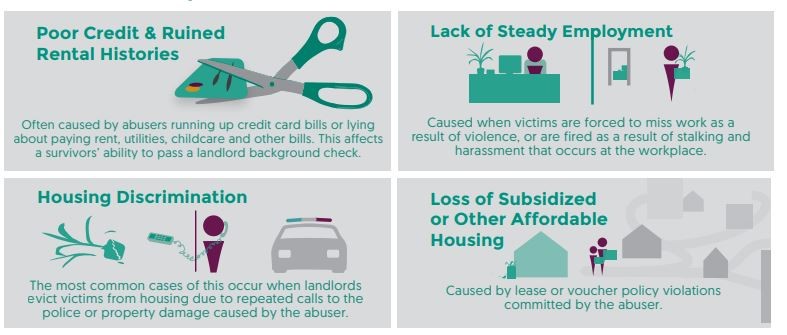Domestic violence can cause housing instability and homelessness for women and their children.
“Victims of domestic violence struggle to find permanent housing after fleeing abusive relationships. Many have left in the middle of the night with nothing but the clothes on their backs, and now must entirely rebuild their lives. As long-term housing options become scarcer, victims are staying longer in emergency domestic violence shelters. As a result, shelters are frequently full and must turn families away.” Quoted from National Network to End Domestic Violence
“Among homeless mothers with children, more than 80 percent previously experienced domestic violence.” (Aratani, 2009)
In a study examining housing problems and homelessness after separation in a sample of 110 women who had experienced domestic violence, 38% reported homelessness (Baker, Cook & Norris 2003).
“A victim of domestic violence will often leave an abuser multiple times before finally escaping the violence, therefore, experiencing multiple periods of homelessness” (Browne & Bussuk, 1997). “ Quoted from National Network to End Domestic Violence
83% of domestic violence survivors entering shelters identified “finding housing I can afford” as a need. This was second only to “safety for myself.” (Lyon, Lane & Menard 2008).
Survivors report that, if a domestic violence shelter did not exist, the consequences would have been severe: becoming homelessness; losing everything (including children); taking desperate actions; or continued abuse/risk of death. (Lyon, Lane & Menard, 2008).
Survivors of Domestic Violence Face Many Barriers to Safety

Infographic From Safe Housing Partnerships
“Abusers commonly sabotage a victim’s economic stability, making victims more vulnerable to homelessness. Many victims and survivors of domestic violence have trouble finding rental properties because they may have poor credit, rental, and employment histories as a result of their abuse (Reif & Krisher, 2000).” Quoted from National Network to End Domestic Violence
“Another study in 2008 found that 65% of the test applicants looking for housing on behalf of a domestic violence survivor were either refused housing entirely or were offered more unfavorable lease terms and conditions than a non-victim.” (The Equal Rights Center, 2008). Quoted from National Network to End Domestic Violence
